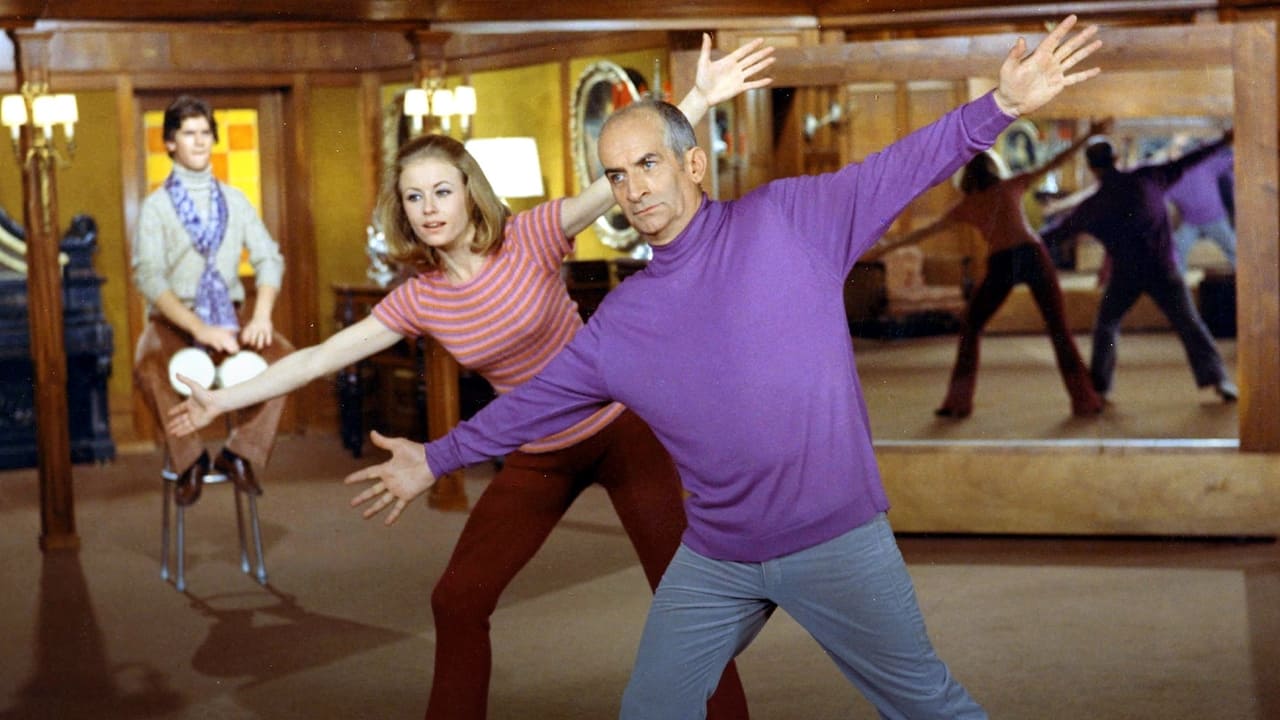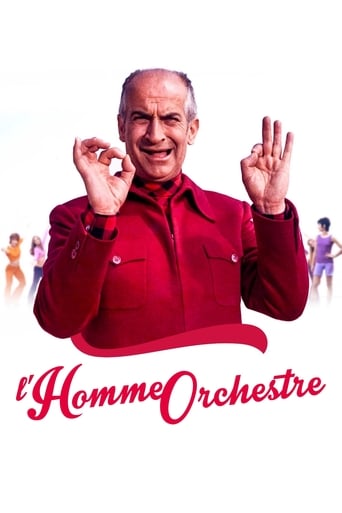



The greatest movie ever made..!
Blending excellent reporting and strong storytelling, this is a disturbing film truly stranger than fiction
View MoreIt’s sentimental, ridiculously long and only occasionally funny
View MoreStrong acting helps the film overcome an uncertain premise and create characters that hold our attention absolutely.
View MoreThere's not much of a plot in Serge Korber "L'Homme Orchestre" (or translated literally "The Orchestra Man") but that takes nothing away from the emotional sweep it provides from one scene to another. Yes, the film is all 70's kitsch but it is oh so full of such jovial and retro-psychedelic exuberance that you just want to embrace its silliness and share a few steps with the dancers. The whole films is like a fantasy but a fantasy that takes one element seriously: music, and music is conducted by a real man-orchestra, a complete artist named Louis De Funès.The comical legend was born in a Spanish family and was a jazz pianist during the war, spending days and nights playing in bars and cabarets before getting his first break in show business and becoming an entertainer. So musical rhythm have been running in his blood for the most part of his life, in fact, one of his earliest successes was the musical-hall themed movie, "Ah les belles bacchantes". Sixteen years later, in 1970, a role like Evan Evans, manager of a dancing company in the South of France might have sounded like a departure from his usual portrayals of bourgeois prominent figures or policemen, but it's in fact a real come-back to his roots that 'Fufu' accomplishes here: stage, music and all.And Funes' experience, more than his comical talent (which is saying a lot) is perhaps the best blessing the film could ever have because his performance is believable, there's a way he uses his body language to match a musical tempo, sometimes he literally grabs the notes with his hand and seem to drive the dancers and musicians to his 'vision', even the way he uses sort of telepathy is the kind of mental gimmick you'd believe a man passionate about his job would use. Much more once the 56-year old man sets his foot on the stage, you don't believe he hasn't been a dancer, De Funès has the moves and it shows in the film. I couldn't think of another actor who could have pulled it better, perhaps Yves Montand, but imagine him directing a group of young women, his charm would operate as smoothly as surely as it would destroy the film's premise.Because De Funès is still De Funès after all, a protective fatherly figure, a man who means business and insists that his company is more disciplined than a convent. His relationship with the girls sets him up as a man of impeccable morality, and that's what backfires at him when a the silly plot about the babies starts. But what I love in his Evan Evans is that he doesn't play his usual self-centered side, except for business reasons, his dedication to his art and to the girls establishes one of his most lovable figure, and even allows his usual shtick to look fresh and original because this time he doesn't preach the same choir.You see him teaching them self-defense, serving dinner but not after checking their weight, and in one of the film's most memorable scene telling them the story about the wolf and the lamb, and that scene alone is a showcase of his comedic gifts. These moments are full of irresistible tenderness and even the girls are believable in that role, because they don't act as if they were with Evans but with De Funès, so even with so many small roles, there's never a performance that doesn't ring true. They even manage to outsmart him a few times. And you can tell he knows his girls, their habits, their manners, their languages etc. Not to mention that the film captures a sort of lost coquettish innocence exulting from these little dances, one I'd take over all the bare-ass humping we handle today.De Funès' movies have always been divided in two, those that aged well, those that didn't and in the late 60's many movies seemed to simply exploit his popularity and give him rather meager scripts where you could throw a few tantrums and mimics and attract one million or two; De Funès wasn't fooled by that and admitted he did a few stinkers, and it's easy to spot them, there's a reliable test to determine if it's a good or bad De Funès, when he relies too much on crazy mimics and grimaces, it means that the film is desperately begging you to laugh, when the film is good enough, De Funès doesn't overplay it.Another reason the film works is that it cleverly exploits the presence of his son Olivier and doesn't just play him as an obedient and handsome sidekick or foil to his father (uncle in the film). Philippe starts as a naive young man and a pawn of one of his uncle's most cunning scheme (you'd see how far he'd get to keep one of his girls) but there's an evolution all through the film, and his good looks and moderate singing talent contributes to very memorable musical moments, the most defining being the little duet with De Funès while they're pampering two babies. The little tone of this sequence, the intimacy between the two men, redeem all the contrivances of the plot, you know this is a film that trusts its material enough it knows it can get away with a little silliness.The music is catchy and memorable, the outdoors shot in Italy gives it's a nice international flavor and I wonder if some montage sequences weren't ahead of its time, but the bottom-line is that it is one of my favorite De Funès' movie and it's not just nostalgia, many movies I enjoyed as a kid didn't improve that well over the course of the year.
View MoreThose were the seventies, alright. (especially for those like me who only remember them vaguely) Saturated primary colors everywhere, telephones shaped like pyramids or like molten wax, easy chairs that were all but easy to sit on, catchy music, silly lyrics. This movie is as stylized as it can be (short of a Greenaway movie) and provides silly, but stylish entertainment.Louis de Funès, at 56, shows that he is not only still the explosive comedian we all love, but that he is able to sing (in his way) and that he can even play a convincing chef-de-ballet, able to hold a candle to his female co-stars when it comes to dancing...And, as another reviewer pointed out, we come to see his softer side as well, in his relationship with his nephew (actually real-life son), "his" girls, "his" babies.The film benefits much from an excellent all-female dance chorus, and the dance numbers are catchy, and top-notch in their 1970 silliness.A very uncommon movie if you expect standard LdF fare. Plot is, of course, nonexistent as any de Funès movie, but here we have abundant song and dance numbers, a Babylonian confusion of at least five languages (shadows of Tati's "Play Time", perhaps?), a dancing (!) Louis de Funès, and, as I said, plenty of 1970 design (atrocities, if you want) in brilliant colors, including the girls' costumes, which magically change between scenes.9/10 all in all. Too many plot holes for a perfect 10, and sadly Olivier de Funès's acting talents, despite his good looks, cannot hold their ground for a lead role against his father. (He wisely chose to pursue a different career after one more movie) Yet, the movie is highly entertaining, stylish and Louis de Funès's acting makes this one his finest.
View MoreThis is a rather obscure movie of De Funes even in France in spite of it is one of his best.What makes the difference is not the comedy because he is as funny as ever but his compassionate side that we don't see very often. This wasn't a surprise because in interviews, you can see that he was a formidable gentleman even having tremendous success. But, there are only a few movies in which he shows his kindness.Here, it begins with the relation that he shares with his real son in life, Olivier. They are nearly the only men in the movie and they are great together. As a father, De Funes is very attentive and caring. And for sure, the scenes he had with the babies are moving: he is totally sweet! In addition, the movie is an explosion of colors and it is an amazing collection of how the 70's, the flower power had impacted on France. Except maybe in "Dick Tracy", I haven't seen so much orange, yellow, red, black, blue At last, the movie offers a great trip in romantic place: Montecarlo, Roma For a movie which is a musical comedy, with dance, songs, music, ballets, I am totally appreciative! Bidibidi-BA!
View MoreI saw this film in India in the mid-70s an a dubbed English version called "One Man Band". Louis des Funes was already popular thanks to his "Fantomas" movies and this one is a very inventive comedy. Worth watching and to keep when available. I have been looking for a video of this film for years.
View More